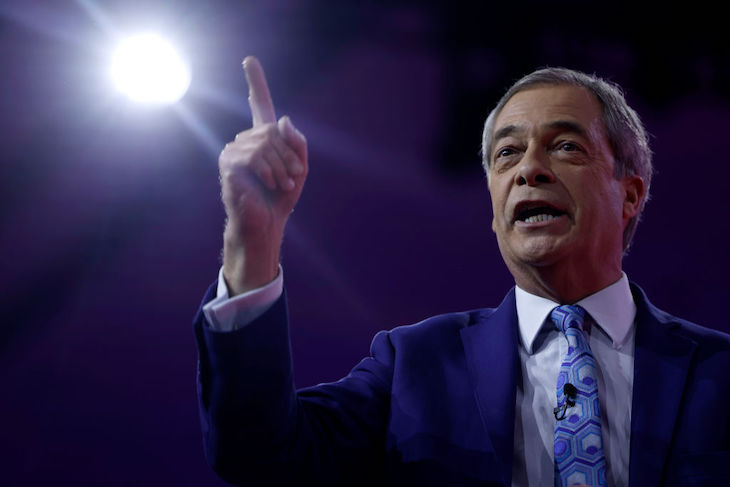These are heady times for Britain’s smaller political parties. Seldom has there been as much interest from voters in breaking away from the stale embrace of the entity known to many as the ‘LibLabCon’.
On the left, the Greens keep growing – though their addiction to identity politics in general and the militant trans movement in particular puts a ceiling on their potential progress.
In the muscular centre, there is a revival of the SDP making steady progress. The party, which these day is stoutly pro-Brexit and leans to the left on economics and the right on culture, won a second seat on Leeds City Council from Labour in May. It now has around 2,000 members, of which I am one. Its leader, the erudite William Clouston, has taken advantage of Britain’s new broadcast media platforms, becoming a frequent guest on GB News and Talk TV.
But it is on the radical right that there is most activity, with the Reform party led by Richard Tice regularly chalking up six per cent vote shares,. The Reclaim party, led by Laurence Fox, also garners headlines connected to Fox’s increasingly out-there stunts, most lately burning Pride flags in his back garden.
Nigel Farage said the one thing that could tempt him back would be a new electoral system
Ukip trundles on, rumour has it on the back of bequests from little old ladies who drew up their wills when it was in its pomp a decade ago. Once in a while recordable support for it shows up in an opinion poll, more I suspect as an inchoate yell of pain from voters on the right than as an expression of any actual firm intention to vote for it. In actual elections it performs notably terribly for a party with high brand recognition.
There can be little doubt that the multiple first rank political problems afflicting the government, combined with merry myth-making about the defenestration of Boris Johnson means there are more right-of-centre voters than ever keen to find a new outlet for their views. To these voters the Conservative party seems both jaded and incoherent. Within a single parliamentary term, it has adopted more positions than are described in the Kama Sutra on first order issues such as the economy, immigration and the encroachment of identity politics.
So why aren’t the major parties more worried about this flourishing small party eco-system? Mainly, I think, because each new one that garners some attention reduces the threat of any single one truly breaking through. We are not talking independent record labels here or a boom in podcasts progressively reducing audiences for mainstream current affairs programming.
Politics has a very different sort of market – a rigged one that ensures a monopoly in every parliamentary seat for the outfit with the biggest market share in that locality. There are no rewards for having the second highest market share in swathes of the country, as Ukip found in 2015 when it was runner-up in more than 120 seats.
It is quite possible, for instance, that in 2024 Reform could come second in Barnsley, as its forerunner the Brexit party did in 2019, or that the Yorkshire party could come third. But realistically, Dan Jarvis will be returned as MP again. Equally in Boston & Skegness, there is likely to be a surge for Reform or another right-wing party on the back of growing voter unhappiness over illegal immigrants being put up in sea-front hotels. But it would take a staggering political earthquake to unseat the Tory MP, Matt Warman.
The first-past-the-post electoral system makes it almost impossible structurally for a smaller party to break through – just read up on the trajectory of the SDP first time round in the 1980s or of Ukip 2010 to 2016. Larger parties can advertise this to the electorate, leaving millions of people convinced that backing a smaller party would amount to a ‘wasted vote’ and further depressing the tiddler share in general elections.
No wonder that on his GB News programme last night, Nigel Farage said the one thing that could tempt him back full-time into the party political fray would be a new electoral system. Were the next election to result in Labour being the largest party, but dependent on Liberal Democrat support for a stable majority, then politics would be in a sweet spot for advocates of proportional representation. The Labour leadership could just decide that this is as good as it gets and hold an early referendum on PR in a bid to lock the Tories out of power.
That really would be a gamechanger. In 1983, a PR electoral system would have returned around 150 SDP MPs; in 2015, about 80 Ukip legislators would have poured into the House of Commons rather than the one who did. And with the ‘wasted vote’ argument made redundant it is quite possible that one or more smaller parties could do even better.
Small parties can, of course, achieve great things even without much parliamentary representation. The SDP’s 1983 performance undoubtedly contributed to Labour abandoning the hard left in search of electability. Ukip’s showing at by-elections from 2010 onwards terrified the Tories into pledging an EU referendum, allowing it to achieve its founding aim. They can also sink without trace: Change UK anyone?
Were I in Farage’s shoes I’d jump back in before the next election to lead Reform but with a cannier game plan: stand candidates everywhere in the full knowledge that this will consign the Tories to defeat in scores of marginal seats, come out in support of Suella Braverman for party leader immediately after a heavy Tory defeat, join the Conservatives if she triumphs and then turn them fully Farage-ist from the inside.
Perhaps a ‘sweet spot’ election result will lead to the end of first past the post, but in the absence of that smaller parties are better regarded as battering rams than bandwagons to high office.







Comments